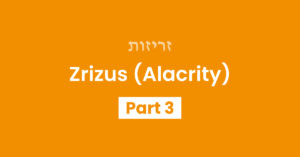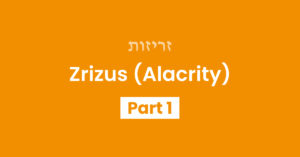Last week, we started discussing the midda of zrizus, which means doing mitzvos quickly and completely, without delay. When we do a mitzvah with zrizus, we show Hashem how eager we are to do His mitzvos. Also, every time we push ourselves to get up and do something we’re not in the mood to do, we are fulfilling the essential mission of mankind – overcoming our earthy, heavy, lazy nature in order to do Hashem’s will.
Another way we can use zrizus to show Hashem our eagerness to do His Will is to learn halachos and ask halachic questions in advance.1 Because if we want to show Hashem how eager we are to do His will, the first basic step is that we need to find out exactly what He wants!
Another way we can use zrizus to show Hashem our eagerness to do His Will is to learn halachos and ask halachic questions in advance.
Imagine that you are planning to go to the supermarket, and your neighbor asks if you can pick up some yogurt for them while you’re in the store. You take note of their request, but as you’re about to walk out the door, you realize that you forgot what type of yogurt they wanted – Was it low fat? Greek yogurt? Cholov Yisroel?
You now have a choice: You can either ask them right now what kind of yogurt they want, or you can go to the store, pick out a random yogurt, and hope they will be satisfied with your choice.
Which option demonstrates more caring?
Obviously, the more caring thing to do in this situation is to stop and ask your neighbor what kind of yogurt they wanted. Otherwise, you’ll end up in the store being unprepared for buying what they need.
The same is true with our relationship with Hashem. We often find ourselves in situations where we don’t know what Hashem wants us to do, yet we need to act fast. For example: You are in the middle of Shemoneh Esrei and the chazzan starts saying Kedusha. Does Hashem want you to stay silent, or to answer? [See this chart for the answer!] Or you ate an apple an hour ago and have not yet said Borei Nefashos… Are you still allowed to say Borei Nefashos now, or is it too late?
In situations like these, it’s not always easy to stop and find out the halachah on the spot. Sometimes you simply don’t have the time to do it, or you don’t have easy access to a Rabbi or a sefer to find out the answer.
Acting with zrizus in these cases means thinking ahead, and learning halachos in advance, before you encounter a questionable situation.
A person who prepares himself by learning halachos before encountering a questionable situation is using zrizus to express his love for Hashem and eagerness to fulfill Hashem’s will. In this case, zrizus means acting immedialy and not delaying when it comes to finding out Hashem’s will.
A person who prepares himself by learning halachos before encountering a questionable situation is using zrizus to express his love for Hashem and eagerness to fulfill Hashem’s will.
This week (especially as we meticulously prepare our homes for a chametz-free Pesach), let׳s practice using zrizus in the realm of halachah. Lets choose to learn halachos sooner rather than later, to show Hashem how eager we are to do His will.
Sources: [1] Orchos Tzaddikim: Shaar HaZrizus
Your Challenge
Once a day, learn a NEW halachah that you didn’t know before.
- Either find out the answer to a question you have now, or to a question you expect to encounter at some point in the future (especially Pesach-related questions!)
- You can ask your question to a Rabbi, look up the answer in a sefer, or learn any new random halachah from a book or sefer.
(Did you know? The Halachah Hotline of the Five Towns has Rabbanaim available on call to answer your halachah questions! Call 516.239.2500)
Torah Questions
- It says in Shemos 2:8: “The young girl went and called the mother of the boy.” Rashi says that actually, this was not a young girl at all. Rather, the Torah calls her a “young girl” because she ran with such zrizus and energy, like a young girl would run. Who was this “young girl”?
- Which Hebrew word does the Torah use to describe the quick manner in which the Jewish people left ֵEgypt? (See Devarim 16:3)
- Which mitzvah are we commanded to do on Pesach, in order to remember the fact that we left Egypt in such a hurry?
- In Bamidbar Chapter 31, Hashem commanded Moshe to do something, but told Moshe that he will die as soon as he’s done fulfilling the command. Nevertheless, Moshe fulfilled Hashem’s command right away, even though he knew he would die as soon as it was over. What was Moshe commanded to do?
- Pirkei Avos (2:4) tells us: “Don’t say, ‘I’ll learn as soon as I have more time…’ because maybe ______.” What reason is given in Pirkei Avos for why you should not push off learning Torah?
- The Gemara (Brachos 6b) says that you should NOT run when you LEAVE a certain place, but you SHOULD run on your way TO that same place. Which place is it?
- Shlomo HaMelech says that a certain type of insect teaches us not to be lazy. Which insect is it? (See Mishlei 6:6)
Questions to Ponder
- Why does the Mesilas Yesharim say that you need to develop the middah of Zehirus (being careful with how your perform mitzvos) BEFORE you work on Zrizus?
- The Orchos Tzaddikim says that a person must develop his middah of Zrizus before developing the rest of his middos. Why is Zrizus a foundation for the rest of the middos?
- Why is it important to remember that we left Egypt in a hurry? What does Yetzias Mitzrayim have to do with zrizus?
- The Shelah HaKadosh writes that when developing the middah of zrizus will help you protect yourself from the yetzer hara’s attacks. How so?




